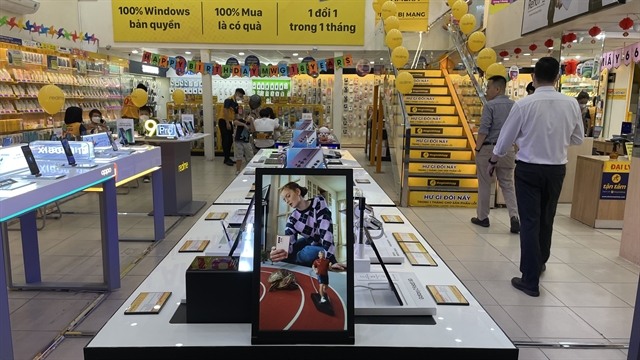Despite the slight improvement in volume to 13.4 million units, this figure is still comparable to the 2015 market when it was still in a growing phase.

Viet Nam's smartphone market saw a dip in shipments by 15.6 per cent in 2022, marking a significant decline in the industry, according to the International Data Corporation's Worldwide Quarterly Mobile Phone Tracker.
Despite the slight improvement in volume to 13.4 million units, this figure is still comparable to the 2015 market when it was still in a growing phase.
In the last quarter of 2022, the market took a sharp downturn, with a 50.3 per cent drop year over year to 2.6 million units, the lowest figure recorded since the third quarter of 2021, when the industry grappled with supply chain disruptions due to the COVID-19 pandemic.
Consumer demand weakened considerably, exacerbated by high inflation and economic uncertainties. The underwhelming figures come as a surprise as the fourth quarter of the year is typically a robust period for the market.
"The rising cost of living and growing macro-economic concerns resulted in significantly low consumer demand, dampening any rebound in 2022 when Viet Nam re-opened," said Thanh Vo, Research Analyst for Client Devices at IDC Vietnam. "This has led to a cautious start in 2023 as vendors rethink their portfolio of devices amidst profitability concerns."
Apple was a bright spot in 2022, being the only top smartphone vendor to weather the decline with a positive growth due to the high demand for the iPhone 14 series despite the production issues in China affecting the iPhone 14 Pro and iPhone 14 Pro Max supplies.
Samsung declined 4.9 per cent quarter over quarter, but it made a remarkable effort in the market downturn. Its Galaxy A-series phones contributed the largest to Samsung's shipments, with the Galaxy A04, Galaxy A13, and Galaxy A23 being the most popular. Samsung's share increased to 40.4 per cent in 4Q22 from 34 per cent in the third quarter of 2022.
OPPO kept its second position with a 21.3 per cent share by units in the last quarter of 2022, despite a slight 0.3 percentage point drop quarter over quarter. Its shipments declined for the second straight quarter with a 21 per cent and a 38.9 per cent year-over-year drop. OPPO's affordable smartphone range, such as the A17k, A57, A77s, and A17, were the main workhorses across its portfolio.
Apple was a bright spot as its shipments increased 42.7 per cent quarter over quarter in the fourth quarter of 2022. The new iPhone 14 series drove the growth of Apple in Viet Nam despite production issues. Apple's overall shipments grew 23.6 per cent year-on-year for 2022, broadly outperforming the market downturn.
Vivo faced a steeper shipment drop of 80.7 per cent year-on-year and 49.5 per cent quarter over quarter in the fourth quarter of 2022, resulting in a more cautious approach and supporting sales by offering discounts and/or other activities. Vivo finished in the last quarter of 2022 with a 6.3 per cent share, a decline from a 9.9 per cent share in the previous quarter.
Xiaomi's shipments dropped down to 138,000 units in the fourth quarter of 2022, a decline of 74.8 per cent year-on-year and 71.0 per cent quarter over quarter as its share declined to 5.4 per cent from 14.9 per cent in the previous quarter. Its Redmi A1, Redmi 10C, Redmi Note 11/Note 11 Pro, and Redmi 9C represented the largest contribution of all Xiaomi smartphone shipments in the fourth quarter of 2022. — VNS





